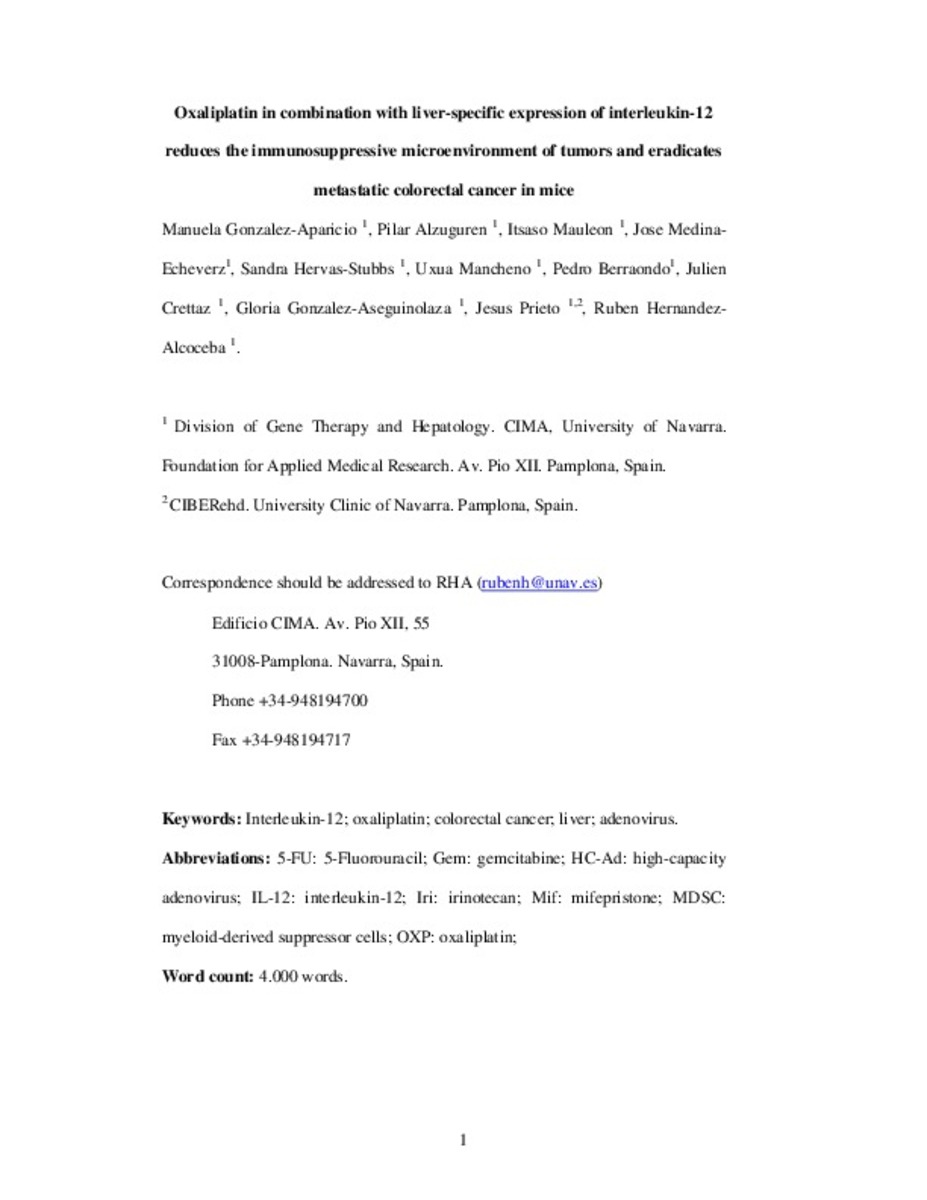Full metadata record
| DC Field | Value | Language |
|---|---|---|
| dc.creator | Gonzalez-Aparicio, M. (Manuela) | - |
| dc.creator | Alzuguren, P. (Pilar) | - |
| dc.creator | Mauleon, I. (Itsaso) | - |
| dc.creator | Medina-Echeverz, J. (José) | - |
| dc.creator | Hervas-Stubbs, S. (Sandra) | - |
| dc.creator | Mancheño, U. (Uxua) | - |
| dc.creator | Berraondo, P. (Pedro) | - |
| dc.creator | Crettaz, J. (Julien) | - |
| dc.creator | González-Aseguinolaza, G. (Gloria) | - |
| dc.creator | Prieto, J. (Jesús) | - |
| dc.creator | Hernandez-Alcoceba, R. (Rubén) | - |
| dc.date.accessioned | 2011-03-29T08:00:35Z | - |
| dc.date.available | 2011-03-29T08:00:35Z | - |
| dc.date.issued | 2011 | - |
| dc.identifier.citation | Gonzalez-Aparicio, M; Alzuguren, P; Mauleon, I; Medina-Echeverz, J; Hervas-Stubbs, S. ""Oxaliplatin in combination with liver-specific expression of interleukin 12 reduces the immunosuppressive microenvironment of tumours and eradicates metastatic colorectal cancer in mice"". GUT 2011; 60: 341-349 | es_ES |
| dc.identifier.issn | 0017-5749 | - |
| dc.identifier.uri | https://hdl.handle.net/10171/17299 | - |
| dc.description.abstract | BACKGROUND AND AIMS: New options are needed for the management and prevention of colorectal cancer liver metastases. Interleukin 12 (IL-12) is an immunostimulatory cytokine with proven antitumour effect in animal models. Despite evidence indicating its biological effect in humans, neither the recombinant protein nor gene therapy vectors expressing IL-12 have shown a relevant benefit in patients with cancer. OBJECTIVE: To develop a new approach to overcome the difficulties in obtaining a suitable expression pattern and the immunosuppressive milieu in the tumours which contribute to this poor performance. METHODS: A high-capacity ('gutless') adenoviral vector carrying a liver-specific, mifepristone (Mif)-inducible system for the expression of IL-12 (HC-Ad/RUmIL-12) was used in combination with chemotherapy. Tumours were established in the liver of C57BL/6 mice by inoculation of MC38 colon cancer cells. RESULTS: Intrahepatic injection of HC-Ad/RUmIL-12 and tailored induction regimens allowed the maintenance of safe and efficient levels of IL-12 in vivo. An individualised, stepwise increase in the dose of Mif (125-4000 μg/kg) was needed to compensate for the progressive but transient downregulation of the inducible system. Repeated cycles of Mif induction (every 24 h for 10 days) were needed for optimal tumour eradication. However, complete protection against tumour rechallenge was seen in < 25% of the animals. The administration of oxaliplatin (5 mg/kg intraperitoneally) 3 days before starting the induction regimen achieved efficient elimination of liver metastases with a single cycle of IL-12 induction, and improved protection against tumour rechallenge. This was associated with a shift in the tumour microenvironment towards a more pro-immunogenic phenotype, with an increase in the CD8+/T regulatory cell ratio and a reduction in myeloid-derived suppressor cells. These effects were not seen with 5-fluorouracil, irinotecan or gemcitabine. | - |
| dc.language.iso | eng | es_ES |
| dc.rights | info:eu-repo/semantics/openAccess | es_ES |
| dc.subject | Materias Investigacion::Ciencias de la Salud::Oncología | es_ES |
| dc.subject | Técnica | es_ES |
| dc.subject | Metástasis | es_ES |
| dc.title | Oxaliplatin in combination with liver-specific expression of interleukin 12 reduces the immunosuppressive microenvironment of tumours and eradicates metastatic colorectal cancer in mice | es_ES |
| dc.type | info:eu-repo/semantics/article | es_ES |
| dc.relation.publisherversion | http://gut.bmj.com/content/60/3/341.abstract | es_ES |
Files in This Item:
Statistics and impact
Items in Dadun are protected by copyright, with all rights reserved, unless otherwise indicated.






